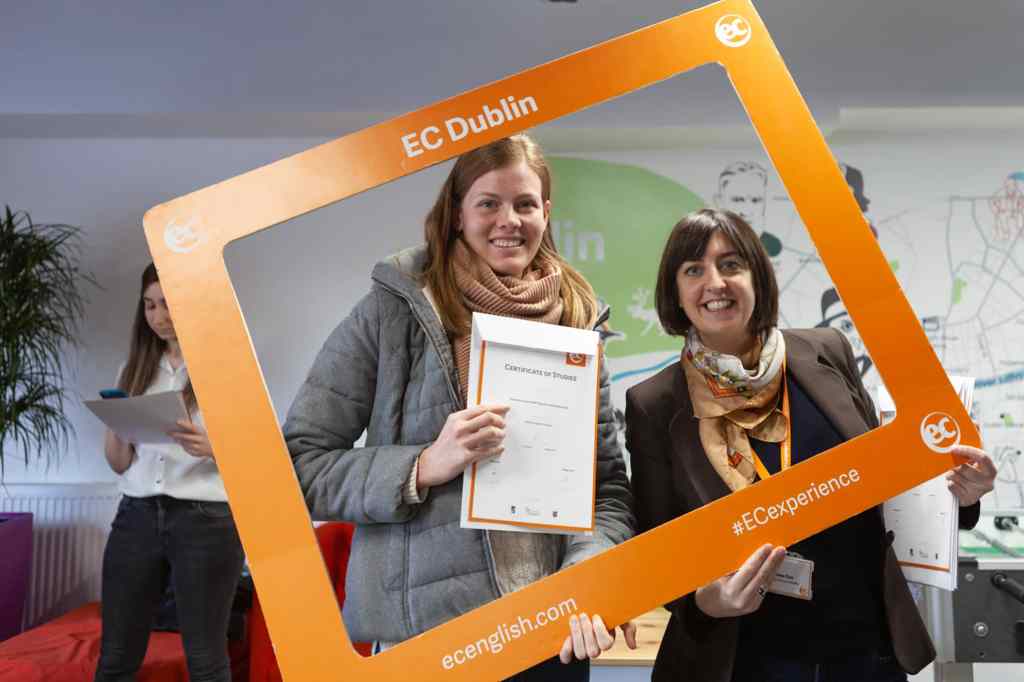
Every year, thousands of students pack their bags, wave goodbye to their loved ones, and enrol in a language school in an English-speaking destination.
Learning English abroad can change your life. It helps you quickly improve, see the world, and meet new people. But not all language schools are the same. With so many options, choosing the right English school can feel hard because you want to get the most from your time and money. Let’s walk you through the process step by step so you can make the best decision.
‘The world is your oyster.’ In today’s terms, this famous idiom invented by William Shakespeare means you can achieve anything or go anywhere in life, because you have the opportunity to do so. The world is full of places to discover. Don’t sit back and wait for doors of opportunity to open for you. The key is in your hands. Don’t say you’re too old or too busy for this, or that you don’t have time. You know you want to do it!
Each destination holds a special experience, and no matter who you are, what you do, or who you want to become, there’s a perfect destination for everyone. It all depends on what kind of traveller you are…
You’re fascinated by all things cultural. Maybe friends have called you a ‘nerd’ or a ‘bookworm.’ You can’t resist the charm of a new book, a visit to a museum, or catching the latest literary movie.
Nothing excites you more than the thought of roaming long, wide, and busy streets, lined with shops, restaurants, and cafés, while looking up at monumental buildings and colossal skyscrapers. You love the thought of watching street artists perform as you buy a snack from a food stall. You simply love the city buzz: the crazier it gets, the better you feel!
You love to get physical! There’s nothing you enjoy more than a trail or hike in the countryside, or a leisurely walk around a garden or park. You’re quite sporty, and like the idea of a morning or afternoon spent snowboarding, mountain-biking, skiing, kayaking, or rainforest roaming. Rolling hills, deep green meadows, snow-dusted mountains, rivers, and lakes all put a smile on your face.
Sandy or rocky? It doesn’t matter as long as you can feel the sun on your skin and the sea breeze in your hair. You would be happy to live on the beach, wearing shorts or a light summer dress, and flip-flops. A beach towel and a magazine are all you really need, but you wouldn’t mind the company of other sun worshippers to practise your English or share an ice-cream with.

The first step is to decide where you want to study English. When choosing a country, think about these factors:
Cost of living: Some countries are more expensive than others. The UK and Australia typically have higher living costs than countries like Ireland, Malta and some American cities.
Visa requirements: Check how easy it is to get a student visa. Nobody wants their dream cut short by paperwork! Some countries have simpler processes than others. See how long you can stay and whether you can work part-time (this is an option in some destinations, so check carefully).
Climate: Do you prefer warm or cold weather? This affects your daily comfort and activities outside school.
Cultural interests: What types of culture interests you the most? Consider each country’s food, history, sports, and lifestyle.
Distance from home: How far are you willing to travel? Being closer to home makes visits easier, but going further away can give you a more immersive experience.
Each English-speaking country offers something unique in terms of accent, lifestyle, culture, and cost. Here are some of the most popular countries for studying English abroad:
The UK is the birthplace of the English language, and studying here gives you the chance to experience traditional British culture. You can choose from historic cities like Cambridge and London, or coastal towns like Brighton and Bristol.
Studying in the USA means learning English in one of the most diverse countries in the world. From New York to Los Angeles, Boston to San Francisco, you’ll find schools in every setting imaginable.
Canada is known for its friendly people, beautiful nature, and safe environment. English is one of its two official languages, and you can learn it in vibrant cities like Toronto, Vancouver, and Montreal.

Malta is a small island in the Mediterranean where English is an official language. It’s a sunny, affordable option for European students who want to study in the EU.
Ireland is famous for its friendly and welcoming atmosphere. Its strong education system and native English environment make it an excellent alternative to the UK for international students.
South Africa is a great choice if you want a more adventurous experience. Students love it here because you can learn English and explore safaris, beaches, and mountains all in one place.
When choosing your country, consider the kind of experience you want (urban, rural, or coastal) and whether it aligns with your goals and budget.

Before choosing your language school, it’s important to research the city you’ll live in. The city you choose will have a big influence on your experience. Ask yourself:
Big cities like London and New York offer more opportunities, with more cultural activities and larger international communities, making it easier to meet people and find student discounts.. However, big cities are often more expensive and can feel overwhelming if you are not used to them.
Smaller cities like Manchester or Malta (yes, we know it’s not a city!) often have lower living costs, friendlier atmospheres, and less distraction from studies. However, they may have fewer entertainment options and smaller international communities.

Where is the school situated? Is it in the heart or the outskirts of the city? How far is it from the nearest bus stop or train station?
Keep your search focused on the most central and convenient city locations. The closer the school is to the heart of the action, the more pleasant your experience will be. It will save you lots of time and money on transport tickets, too! Living and learning in a city is a complete social and cultural immersion experience. Who wouldn’t want to be at the centre of it all?
Always look out for accreditations on schools’ websites before choosing an educational institution. An accreditation is like a seal of approval, a guarantee of quality, and proof that the school offers only the highest standards of teaching and learning.
Accrediting bodies schedule regular visits to inspect the schools’ quality of teaching, administration, management, and student services. The best schools will ensure you learn English in a safe environment, with access to everything you need to make your stay comfortable and satisfying.
Look for these accreditations
Different countries have different accrediting bodies. For example
Don’t study English in a school that doesn’t have proper accreditation. Unaccredited schools may provide poor education, and your certificate may not be recognised.

Small schools with fewer classrooms are sometimes referred to as ‘boutique’ and offer a more familiar and intimate space in which to learn English. Some students prefer smaller schools with fewer students because they want more individual attention.
Being in a large school naturally offers other benefits. You will find more people to socialise with and meet in class, and the mix of nationalities (see 4. Nationality Mix) will be greater.
Since the number of students is large, placement test scores will be close to yours, and you will then be placed in a class with students whose level of English is similar to your own, putting you at a comfortable advantage.
Do keep in mind that schools, no matter how small or large, go through quiet and busy periods throughout the year, so student numbers will vary.
If you want to learn the most English during your study abroad time, make sure you choose a school where the other students have a good mix of nationalities. This will mean you have no choice but to communicate in English as you make new friends. It will really accelerate your learning!
Nationality mix lists or charts are often published on schools’ websites, and they are a practical way of showing where and when you would expect to find students of different nationalities (in percentages) throughout the year.
Remember that one of the great things about being on a study abroad programme is that you get to meet people from all over the world, and you have to use English to communicate!
Apart from location, the availability of school facilities should also play an important part in your school selection process.
Your language learning experience can be greatly improved if you are provided with bright, spacious classrooms, quiet spaces to relax or read in, and even a bright and cheerful café or canteen where you can spend a few hours eating and chatting in the company of other foreign students between lessons.
A well-stocked library and a range of learning resources, both digital and non-digital, are also very useful for homework and extra study.
And remember, there’s more to a classroom than a blackboard and a teacher. Smartboards connect to the internet, opening up a world of learning opportunities in fun and interesting ways.
Some schools also arrange suitable accommodation to ensure their students’ stay is as comfortable as possible and suits their lifestyle, budget, and needs. Popular options would include living with locals (homestay), independent living (studio or single apartment), or sharing with other international students (shared apartment or student residence).

If you think learning English is limited to your lesson times, then you’re wrong! A large proportion of your linguistic progress will actually take place outside of the classroom.
For this reason, and also to get the most pleasure from your study abroad experience, it’s important you choose a school that offers a fun and interesting variety of after-class activities. These could be sports events, excursions to local places of interest, movie and games nights, and many other opportunities to have fun with your friends, explore your destination, and practise your English in everyday, real-life contexts.
Before making your final decision, read what other students say. Look for reviews across platforms such as the school website, Google, and Trustpilot.
Pay attention to comments about teaching quality, school facilities, student support, and social activities. A few negative reviews are normal, but watch for repeated complaints about the same issues.
Contact former students if possible. Many schools can connect you with alumni who can share honest feedback.

English schools offer a variety of courses for you to choose from, but how do you know which is the right one for you? It’s important you choose the course that best matches your needs.
Whatever your reasons for learning, you should be able to find the perfect programme to help you reach your goal.
Let’s take a look at some things you should keep in mind.
When choosing your course, think about your goals. What is your primary reason for going abroad to learn English?
Let’s take a look at the three most popular motivations – which one sounds like you?
Schools offer short- and long-term courses that are heavily conversation-based to help improve your overall fluency and confidence. You’ll learn the skills you need to socialise in English and deal with a variety of everyday situations like shopping, travelling, and making small talk.
General English courses are designed to help you improve your fluency mainly through speaking, listening, reading, and writing. They are often the standard and most popular school courses in a school.
These programmes are a good option for students abroad for a short time who want to build up their English confidence, while still having enough time to enjoy their chosen destination.
Think about the number of hours a day you want to spend in class. Some courses will have more lesson time than others. You can choose a programme with a low lesson intensity if you want more free time, but the more lessons you take, the quicker your language skills will improve.
Taking a short-term intensive course is a good idea for anyone with limited time abroad.
If you are planning to enter a university in an English-speaking country, you will need to have a good level of English and proof that you have reached the required level.
An exam preparation course will prepare you to sit for the qualification you need.
The most common exams are:
Cambridge Exams: These exams are recognised by employers, universities, and colleges worldwide, and the results are valid for life. Choose from:
B2 First: Suitable for those who can deal confidently with a wide range of spoken and written English.
C1 Advanced: For high-level English users who can use English for most professional and academic purposes.
C2 Proficiency: Aimed at students who are able to function effectively in almost all English-speaking environments.
IELTS (International English Language Testing System): Most universities in the UK, Canada, Australia, Malta, and some in the US require an IELTS score. It is also often required by professional bodies and needed for immigration to Canada and Australia.
TOEFL (Test of English as a Foreign Language): TOEFL measures your ability to use English at the university level. It is recognised by over 8,000 institutions in over 130 countries, including most North American universities.
TOEIC (Test of English for International Communication): TOEIC scores are used by over 10,000 companies, government agencies, and English-language learning programmes in 120 countries.
Exam preparation courses are for students who want to sit an internationally recognised exam.
You should expect students following these programmes to be very hardworking and completely focused on their goals. In these classes, you will learn the techniques you need to take an exam and the English skills you need for a good score.

If you want to gain a competitive edge in the world of work, there are courses that raise the English level, language skills, and cultural understanding you need for career success.
Business English is, quite simply, the English required to conduct business in a professional manner. A general English course focuses on conversation skills, while Business English teaches you everything needed in business situations.
Because much of the world’s business communication takes place in English, Business English courses are a popular option for professionals looking to improve their career prospects.
You should consider taking a business-focused course if you want to work abroad, be employed by an international company, or do business internationally.
Business English courses should cover two areas: the specific vocabulary used in the business world and the communication skills you need to do business.
In a Business English classroom, you will meet professional people from all over the world. This is a great way for you to make international business contacts and learn about business practices in different countries.
Set your budget, including flights and insurance.
Apply early for popular schools, especially during the summer high school season.
You may want to take a few online English lessons before you depart to get you used to using English.
Don’t worry about fitting in or meeting new people. Schools have a lot of experience welcoming new students, and most students travel alone.
Pack for the weather. Keep an open mind and prepare to experience life in a new culture.
Choosing an English school abroad takes time, but it’s worth it. Start with the country, then the city, then the schools. Focus on accreditation, reviews, and costs. Your best choice fits your goals and budget. Start researching today, and soon you can speak English with confidence on your perfect study-abroad trip. Good luck!
Our student advisors are available to answer your study abroad questions! Contact us today!
Live online English classes for continuous learning.
Did you like this article? Share it!